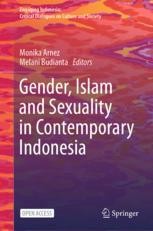Indonesia, a nation composed of thousands of islands and a diverse array of cultures, holds a complex and nuanced perspective on sexuality. Its rich tapestry of traditions, religious beliefs, and social norms shapes the way sexuality is perceived, practiced, and regulated across different communities. Understanding the landscape of sexual culture and norms in Indonesia requires examining legal frameworks, cultural attitudes, religious influences, health challenges, and available resources, which collectively influence the experiences and perceptions of individuals regarding sexuality in the country.
Overview of Sexual Culture and Norms in Indonesia
In Indonesia, sexual culture is deeply intertwined with traditional values, community expectations, and social conduct. Generally, there is a strong emphasis on modesty and reserve, especially among women, which influences public behavior and personal interactions. Premarital sex is widely considered taboo, and discussions about sexuality are often stigmatized, leading to conservative attitudes towards intimate relationships. Despite this, there exists a spectrum of practices and beliefs, particularly among younger generations and urban populations, where more open conversations and exploration are gradually emerging. Nonetheless, the overarching cultural norm prioritizes chastity, familial reputation, and social harmony, shaping the ways Indonesians approach sexuality privately and publicly.
Legal Framework and Regulations Surrounding Sexuality
Indonesia’s legal landscape regarding sexuality is characterized by a mixture of national laws and regional regulations that often emphasize morality and social order. The country’s Penal Code criminalizes acts deemed immoral or indecent, including extramarital sex and homosexuality, although enforcement varies significantly across regions. In some conservative areas, local ordinances impose strict restrictions on sexual behavior, and violations can result in legal penalties or social ostracism. Conversely, there is limited formal regulation concerning sexual health education, which leaves many gaps in awareness and rights. Overall, Indonesia’s legal framework tends to prioritize traditional and religious values over individual sexual freedoms, resulting in a complex environment for addressing issues related to sexuality.
Cultural Attitudes Toward Sex and Relationships in Indonesia
Cultural attitudes in Indonesia generally lean towards conservatism, emphasizing the importance of family, marriage, and social reputation. Sex and relationships outside of marriage are often viewed with suspicion or disapproval, and open discussions about sexuality remain taboo in many communities. Respect for elders and adherence to traditional roles often discourage young people from exploring or openly expressing their sexual feelings. However, urbanization and exposure to global media have begun to influence some shifts in attitudes, especially among youth, who may seek more open dialogues about love, sexuality, and gender roles. Still, the overarching cultural norm favors discretion, modesty, and adherence to societal expectations surrounding intimate relationships.
Impact of Religion on Sexual Practices and Beliefs
Religion plays a significant role in shaping sexual practices and beliefs in Indonesia, a country where Islam is the predominant faith, alongside Christianity, Hinduism, Buddhism, and indigenous beliefs. Islamic teachings, which influence many aspects of daily life, generally promote sexual morality within the bounds of marriage and discourage premarital sex, homosexuality, and other non-conforming behaviors. Religious leaders and institutions often advocate for chastity and fidelity, reinforcing conservative attitudes. Conversely, some minority religious groups and local traditions may have more permissive or varied perspectives on sexuality. Overall, religious doctrines strongly influence individual behaviors, community standards, and public policies related to sexuality, often reinforcing conservative views and limiting open discourse on sexual matters.
Challenges and Issues Facing Sexual Health Education
One of the significant challenges in Indonesia regarding sexual health education is the limited and often conservative approach taken within schools and communities. Due to cultural and religious sensitivities, comprehensive sex education is not widely implemented, leaving many young people uninformed about reproductive health, contraception, consent, and sexually transmitted infections. This lack of open dialogue contributes to higher rates of teenage pregnancies, unsafe abortions, and the spread of HIV/AIDS. Additionally, stigma surrounding discussions of sexuality hampers efforts to promote awareness and access to resources. NGOs and international organizations are working to fill these gaps, but social resistance and policy limitations continue to hinder the development of effective, inclusive sexual health programs.
Resources and Support Services for Sexual Wellbeing in Indonesia
Despite cultural and legal challenges, Indonesia offers various resources and support services aimed at promoting sexual wellbeing. Government health clinics provide reproductive health services, including contraception and STI testing, often with a focus on maternal health. Non-governmental organizations and international agencies work to raise awareness and provide education on issues such as HIV prevention, safe sex practices, and gender-based violence. There are also confidential helplines and counseling centers available for individuals seeking guidance on sexual health and relationships. However, access and acceptance of these services can vary widely depending on geographic location, community attitudes, and socioeconomic status, highlighting ongoing disparities in support for sexual wellbeing across Indonesia.
Indonesia’s landscape of sexuality is shaped by a complex interplay of cultural traditions, religious beliefs, legal regulations, and social attitudes. While conservative norms and religious influences often impose restrictions, changing dynamics, especially among urban youth, are gradually fostering more open conversations about sexuality and health. Addressing the challenges in sexual health education and expanding accessible resources remain crucial for promoting informed, healthy, and respectful attitudes toward sexuality in Indonesia. As the country continues to evolve socially and culturally, ongoing dialogue and inclusive policies will be essential in supporting the sexual wellbeing of its diverse population.









